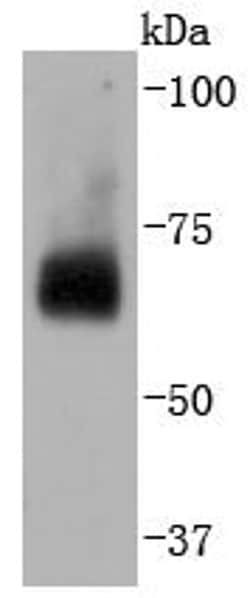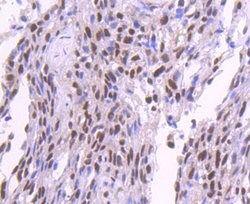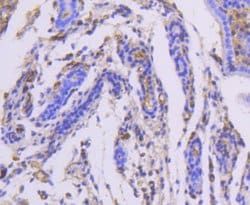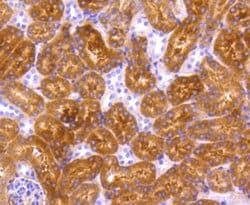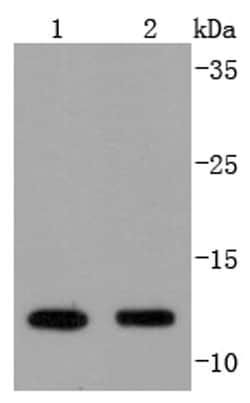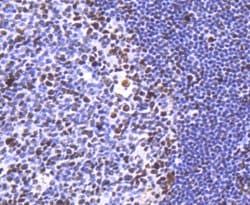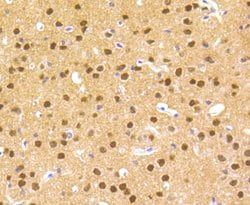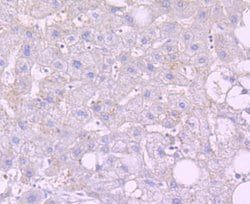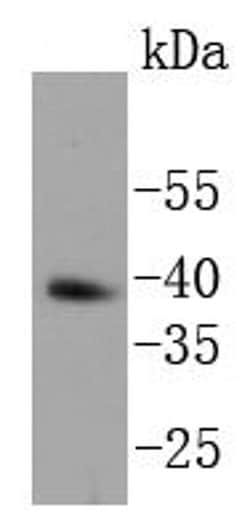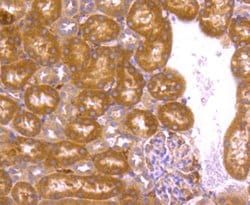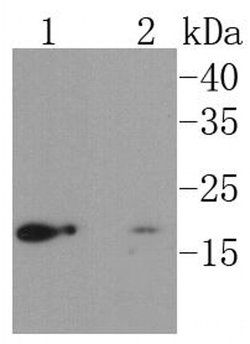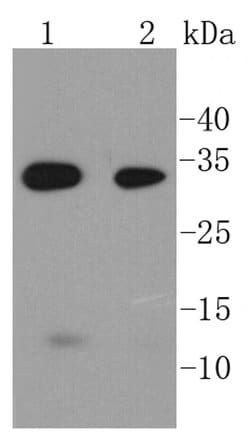Nanog Recombinant Rabbit Monoclonal Antibody (SC05-70), Invitrogen™
Manufacturer: Thermo Scientific
Select a Size
| Pack Size | SKU | Availability | Price |
|---|---|---|---|
| Each of 1 | PIMA532198-Each-of-1 | In Stock | ₹ 47,481.50 |
PIMA532198 - Each of 1
In Stock
Quantity
1
Base Price: ₹ 47,481.50
GST (18%): ₹ 8,546.67
Total Price: ₹ 56,028.17
Antigen
Nanog
Classification
Monoclonal
Concentration
1 mg/mL
Formulation
TBS with 0.05% BSA, 40% Glycerol and 0.05% sodium azide, pH 7.4
Gene Accession No.
Q80Z64, Q9H9S0
Gene Symbols
NANOG
Immunogen
Recombinant protein within Human Nanog aa 9-49
Quantity
100 μL
Primary or Secondary
Primary
Target Species
Human, Mouse
Product Type
Antibody
Isotype
IgG
Applications
Flow Cytometry, Immunocytochemistry, Immunohistochemistry, Western Blot, Western Blot
Clone
SC05-70
Conjugate
Unconjugated
Gene
NANOG
Gene Alias
2410002E02Rik, early embryo specific expression NK family, early embryo specific expression NK-type homeobox protein, Ecat4, ENK, ES cell-associated protein 4, FLJ12581, HGNC:20857, hNanog, Homeobox protein NANOG, homeobox transcription factor Nanog, homeobox transcription factor Nanog-delta 48, Nanog, Nanog homeobox
Host Species
Rabbit
Purification Method
Protein A
Regulatory Status
RUO
Gene ID (Entrez)
71950, 79923
Content And Storage
Store at 4°C short term. For long term storage, store at -20°C, avoiding freeze/thaw cycles.
Form
Liquid
Description
- Recombinant rabbit monoclonal antibodies are produced using in vitro expression systems
- The expression systems are developed by cloning in the specific antibody DNA sequences from immunoreactive rabbits
- Then, individual clones are screened to select the best candidates for production
- The advantages of using recombinant rabbit monoclonal antibodies include: better specificity and sensitivity, lot-to-lot consistency, animal origin-free formulations, and broader immunoreactivity to diverse targets due to larger rabbit immune repertoire
- NANOG (Nanog homeobox) is a divergent homeodomain protein that directs pluripotency and differentiation of undifferentiated embryonic stem cells
- NANOG mRNA is present in pluripotent mouse and human cell lines, and absent from differentiated cells
- Human NANOG protein shares 52% overall amino acid identity with the mouse protein, and 85% identity in the homeodomain
- Human NANOG maps to gene locus 12p13.31, while the mouse NANOG maps to gene loci 6 F2
- Murine embryonic NANOG expression is detected in the inner cell mass of the blastocyst
- Research studies have shown that high levels of human NANOG expression in the undifferentiated N-Tera embryonal carcinoma cell line
- Further, NANOG is a transcription regulator involved in inner cell mass and embryonic stem (ES) cells proliferation and self-renewal
- The role of NANOG in embryonic development suggested that it might be useful in the creation of stem cells that might be useful in cell replacement therapies in the treatment of several degenerative diseases
- Artificial stem cells, termed induced pluripotent stem (iPS) cells, can be created by expressing POU5F1 (also known as Oct-4), another germline-specific transcription factor, and the transcription factors Sox2, Klf4 and Lin28 along with c-Myc in mouse fibroblasts
- Experiments have demonstrated that iPS cells could be generated using expression plasmids expressing NANOG, Sox2, KlfF4 and c-Myc, eliminating the need for virus introduction, thereby addressing a safety concern for potential use of iPS cells in regenerative medicine
- When overexpressed, NANOG promotes cells to enter into S phase and proliferation
- Diseases associated with dysfunction in the NANOG protein include tetracarcinoma and germ cell/embryonal cancer.
